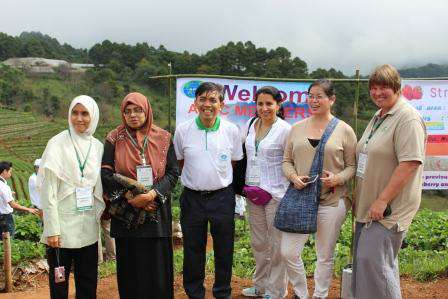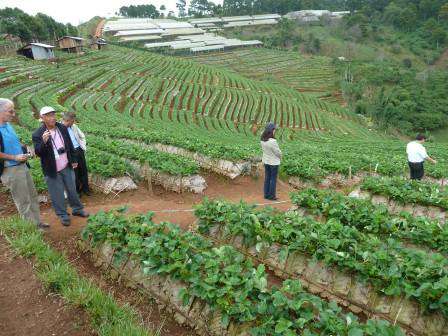Coping with natural disasters is a way of life for south-east Asian farmers, Goulburn Broken Catchment Management Authority Landcare Corporate Partnerships Facilitator Karen Brisbane learned during a recent trip to Thailand.
Coping with natural disasters is a way of life for south-east Asian farmers, Goulburn Broken Catchment Management Authority Landcare Corporate Partnerships Facilitator Karen Brisbane learned during a recent trip to Thailand.
Ms Brisbane's trip to Thailand late last year was funded through the Heather Mitchell Fellowship Award she received in 2011 at the State Landcare Awards.
The first part of her 10-day trip involved attending the 2012 APEC workshop on sustainable agriculture in Chiang Mia, where she was invited to make a presentation on Landcare in Australia. The rest of the trip involved visits to various sustainable agricultural projects and initiatives under way in Thailand.
"About 13 countries were represented and the overall concerns to come out of the workshops were very similar to those faced here: degradation and over-clearing of land; trying to keep young people interested in farming; and food security," Ms Brisbane said.
"But the really big challenges producers in south-east Asia face are natural disasters such as typhoons. It's not unusual for 20 typhoons a year to sweep through certain areas, which makes it very difficult for producers and means that much of the arable land is not as productive as it could be."
Ms Brisbane's presentation on Landcare generated a great deal of interest from workshop participants as well as with farmers and government officials she met during her trip.
"We talked about approaches for training Thai farmers about Landcare as well as the idea of farmer and scientist exchanges to Australia," she said.
"While Landcare is very new there, the Landcare logo is well recognised and has a lot of pull."
Two of Thailand's sustainable agricultural programs – the Soil Doctor Project and Royal Projects - would work well with the Landcare model, Ms Brisbane said.
The government's Soil Doctor Project trains a volunteer in a village to help local farmers with soil or production issues. The Royal Projects are an initiative of Thailand's revered and long-serving King Bhumibol Adulyadej. There are 38 Royal Projects operating in five provinces in northern Thailand providing food for the tourist trade and local hill tribes. The projects support communities that once relied on illegal crops for their main income. The Royal Projects provide income and food for the regions, encourage students to attend school, fund infrastructure and foster sustainable agricultural practices.
Ms Brisbane said a visit to the Royal Project in Aunkhang – the first of the projects to be established - was an eye-opening experience.
"The project it is an amazing example of what can be achieved once an ideal is realised. In the 50 years the project has been running the hill tribes of the area have moved away from opium growing to produce and flower farming. The project brings in $3 million baht a year to the two villages of about 170 families."
As well as growing strawberries, fruit, vegetables and cut flowers that villagers sell to tourists and hotels as part of the project, Ms Brisbane said the Aunkhang project had become a popular tourist destination because of its beautiful manicured gardens and scenic views.
"There are amazing gardens that include bonsai, hanging gardens, herbs, orchids, ferns, waterfalls and rows of flowers," she said. "They also sell local produce in a coffee shop attached to a hot house."
Another one of the highlights of her trip was staying with local families.
"The people I stayed with would have been considered quite wealthy by local standards yet their homes were quite simple and I slept on the floor. They were all so friendly and polite and I really enjoyed learning more about their customs, food and way of life," she said.
"While we (Australia) are advanced in regards to sustainable agricultural practices compared to many countries when looking at our place in the world market, I think there is something to be learned by their approach of looking first at supporting the villages or towns before trying to feed and look after the world's food source."

Karen Brisbane (right) with other APEC Sustainable Agriculture workshop delegates at the Royal Project in Aunkhang (Photo: Courtesy of Karen Brisbane)

Strawberries being grown on the slopes at Aunkhang. (Photo: Courtesy of Karen Brisbane)